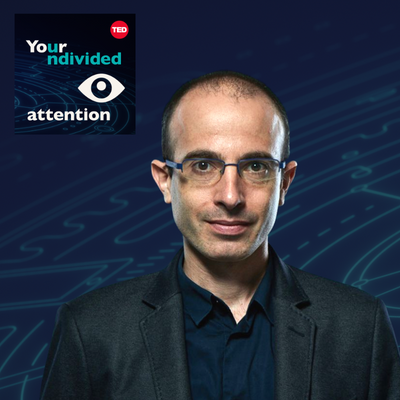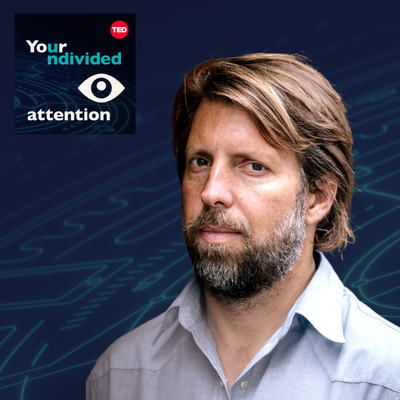Episode 41 | Sep 30, 2021
Making Meaning in Challenging Times with Jamie Wheal
What helps you make meaning in challenging times? As you confront COVID, the climate crisis, and all of the challenges we discuss on this show, what helps you avoid nihilism or fundamentalism, and instead access healing, inspiration, and connection?
Today on Your Undivided Attention, we're joined by anthropologist and writer Jamie Wheal. Wheal is the author of Recapture the Rapture: Rethinking God, Sex and Death In a World That's Lost Its Mind. In the book, he makes the case that in order to address the meta-crisis — the interconnected challenges we face, which we talked about in Episode 36 with Daniel Schmachtenberger, we must address the meaning crisis — the need to stay inspired, mended, and bonded in challenging times. Jamie argues that it doesn't matter whether we're staying inspired, mended, and bonded through institutionalized religion or other means as long as meaning-making is inclusively available to everyone.
What we hope you'll walk away with is a humane way to think about how to address the challenges we face, from COVID to climate — by enabling us to make meaning in challenging times.
Major Takeaways
Along with the meta-crisis — a frame for the interconnected nature of the challenges we face from COVID to climate, which we discussed in episode 36 with Daniel Schmachtenberger — Jamie Wheal believes we're also undergoing a meaning crisis — a collapse in our capacity to find inspiration, healing, and connection in challenging times. In fact, Wheal makes the case that in order to address the meta-crisis, we must address the meaning crisis.
Wheal observes an evolution in our capacity to make meaning over time — which he refers to as Meaning 1.0, 2.0, and 3.0. In his framing, Meaning 1.0 is represented by institutionalized religion, which (in theory) promised salvation but at the cost of inclusion. Meaning 2.0 is represented by liberalism, which (in theory) promised inclusion but at the cost of salvation. Meaning 3.0 must therefore offer inclusive salvation — a capacity to make meaning that is democratically available to everyone, simply by virtue of being human.
The Alchemist's Cookbook is Wheal's playful term for the five ingredients which provide inclusive salvation: breath, movement, music, sex, and substances. These ingredients for meaning-making have been present in cultural traditions since we've been human, and even across species. They can be thought of as primal psycho-technologies or psycho-social technologies — technologies designed to enable psychological and social capacities.
Social media is being used to weaponize the meaning crisis by fringe groups like the Incel community and QAnon, in order to bond over rightful grievances but in a way that often wrongly attributes root cause and appropriate action. On the flipside, social media can be leveraged to address the meaning crisis and re-knit bioregional tribes, as is done by groups like Transition Towns and the 2000-Watt Society.
A Meaning 3.0 way to respond to misinformation, polarization, and the other challenges we discuss on this show would 'Aikido' or 'yes-and' the grievances of these fringe groups, but then rightfully attribute root cause and appropriate action. An example of this is the Facebook profile picture 'frame' that says, "I have a healthy distrust of authority and I'm vaccinated."
At the core of Wheal's belief in addressing the meaning crisis in order to address the meta-crisis is an invitation to make better art — to be mindful and creative about the stories we tell, because they shape the future we create. He says, "we're all living the blues right now. The question is...are we doing it to music, or are we doing it in the ditch?"
Other recommended reading
Recapture the Rapture Website
Website for the book, which contains links to research cited in the book along with tools for building our own versions of Meaning 3.0
Recapture the Rapture Toolkit
Culture architecture toolkit designed to help us find inspiration, healing, and connection for ourselves, our communities, and the world
Ancient Cave Drawings and Early Human Language Linked in New Study
National Geographic article about the study of what Wheal calls "prehistoric IMAX's" -- the discovery that cave art is often closely connected to the acoustic properties of the cave chambers in which it is found
Grooming, Gossip, and the Evolution of Language
Book by anthropologist and evolutionary psychologist Robin Dunbar, which contains his research on the trance dances of the Bushmen of the Kalahari Desert
Examples of 'inclusive meaning making'
Profile picture frame — distrust of authority and COVID vaccination
Venn diagram #1 — considering COVID's implications for public health, the economy, governmental power, and social justice justice
Venn diagram #2 — racial justice and non-violence

![[Unedited] A Problem Well-Stated Is Half-Solved with Daniel Schmachtenberger](https://www.datocms-assets.com/160835/1751312025-63190f617b0b18786a75ec9d_36-your-undivided-attention-daniel-schmachtenberger-square-thumbnail.png)
